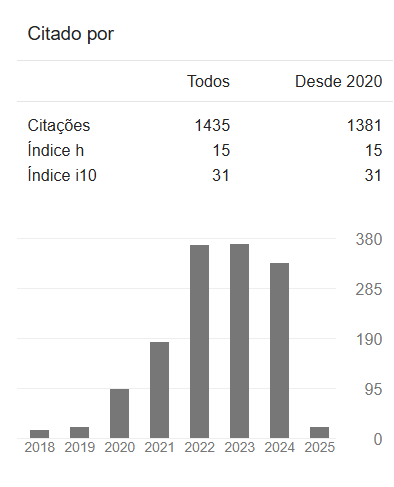DIGITAL LITERACY: A RESEARCH FROM THEORY TO THE TEACHING PRACTICE OF TEACHERS OF MATO GROSSO STATE
DOI:
10.23926/RPD.2526-2149.2018.v3.n1.p249-262.id88Keywords:
Teaching, Teacher, Continued formation, Digital literacyAbstract
The present study is part of a research carried out with 39 teachers of the public education in Mato Grosso and it aims to analyze and verify if the projects of continuous formation of the Center of Formation and Updating of Basic Education Professionals (CEFAPRO), in Cuiabá city, state of Mato Grosso, contemplate the digital literacy of teachers, and, if they do, how they contribute to pedagogical practice in the current technological context. The research was built on a qualitative approach and the instruments of data collection were the questionnaire and the official documents of the State Secretariat of Education, Sport and Leisure (SEDUC). The epistemological anchorage was based on the studies of Moran (2017), Rojo (2012), Soares (2009), among other researchers that deal with technology, digital literacy and teaching. The data were categorized by having the fragments of teachers' discourses organized under the basic guidelines of the Content Analysis proposed by Bardin (2011). The results indicated that the received formation contributed to the pedagogical practice and that most of the interviewees considered themselves able to work with technological resources as a pedagogical tool, however there is still a need for formation, especially in the area of digital literacy.
Downloads
Metrics
References
BARDIN, Laurence. Análise de conteúdo. São Paulo: Edições 70, 2011.
BRASIL, Orientações Curriculares para o Ensino Médio: Linguagens, Códigos e suas Tecnologias. Brasília, Ministério da Educação, Secretaria de Educação Básica. Conhecimentos de línguas estrangeiras, vol. 1, Brasília: MEC/SEF, 2006.
COSCARELLI, C.V; RIBEIRO, Ana Elisa (Orgs). Letramento digital: aspectos sociais e possibilidades pedagógicas. 2. ed. Belo Horizonte: Ceale; Autêntica, 2007.
KALANTZIS, M.; COPE, B. Digital communications, multimodality and diversity: towards a pedagogy of multiliteracies. Scientia Paedagogica Experimentalis, v.45, n.1, p.15-50, 2008.
GIL, Antonio Carlos. Métodos e técnicas de pesquisa social. São Paulo: Atlas, 2008.
KENSKI, Vani Moreira. Tecnologias e ensino presencial e a distância. Campinas: Papirus, 2012.
KLEIMAN, Angela B. Os significados do letramento. Campinas, S.P.: Mercado de Letras, 1995.
LÉVY, Pierre. Cibercultura. São Paulo: Editora 34, 1999.
MATO GROSSO. Secretaria de Educação e Cultura. Decreto nº 2.116/1998.
MORAN, José Manuel; MASETTO, Marcos T.; BEHRENS, Marilda Aparecida. Novas tecnologias e mediação pedagógica. 21. ed. rev. e atual. Campinas: Papirus, 2013.
MORAN. Metodologias ativas e modelos híbridos na educação. In: Novas tecnologias digitais: reflexões sobre mediação, aprendizagem e desenvolvimento. Solange Franci Raimundo Yaegashi et al (Orgs.). Ed. Curitiba: CRV, 2017. p. 23-36.
ROJO, Roxane; ALMEIDA, Eduardo de Moura. Multiletramentos na escola. São Paulo: Parábola Editora, 2012.
ROJO, Roxane; ALMEIDA, Eduardo de Moura. Letramentos múltiplos, escola e inclusão social. São Paulo: Parábola, 2009.
SEDUC. A criação dos Núcleos de Tecnologias Educacionais. Cuiabá: Seduc, 1998.
SOARES, Magda. Letramento: um tema em três gêneros. 3 ed. Belo Horizonte: Autêntica, 2009.
TRIVINOS, Augusto N. S. Introdução à pesquisa em ciências Sociais: a pesquisa qualitativa em educação. São Paulo: Atlas, 1987.
VALENTE, José Armando. O uso inteligente do computador na educação. In: Pátio: Revista Pedagógica. Porto Alegre: Artes Médicas Sul. Ano 1, n.º 1, 1997.
Downloads
Published
How to Cite
Issue
Section
License
Copyright (c) 2023 A Revista Prática Docente tem o direito de primeira publicação

This work is licensed under a Creative Commons Attribution-NonCommercial 4.0 International License.
Authors who publish in this journal agree to the following terms:
- Authors retain the copyright and grant the journal the right of first publication, with the paper simultaneously licensed under the Licença Creative Commons Attribution allows the sharing of the work with acknowledgment of authorship and initial publication in this journal.
- Authors are authorized to take additional contracts separately, for non-exclusive distribution of the version of the work published in this journal (e.g. publish in institutional repository or as a book chapter), with acknowledgment of authorship and initial publication in this journal.











